Majora’s Mask Side-Characters (Volume III – Reader’s Choice)
Posted on September 07 2013 by Cameron Smith
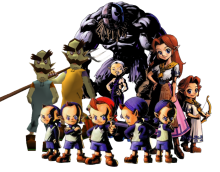 Welcome to the final editorial on the side-characters of Majora’s Mask, and, for that matter, my final editorial on the characters of Majora’s Mask altogether! I’ve got a jam-packed finale for you guys this time, having managed to cram, not four side-characters, but four groups of side-characters into this one, so it’s pretty long! I really should have separated this one into two parts as well, but I thought, why not have an extra-long finale to this series? I hope you’ve been looking forward to this one, because I can guarantee you that it will not disappoint! Keep reading to find out more about the Bombers, the Gorman Brothers, Romani and Cremia, and Zubora and Gabora!
Welcome to the final editorial on the side-characters of Majora’s Mask, and, for that matter, my final editorial on the characters of Majora’s Mask altogether! I’ve got a jam-packed finale for you guys this time, having managed to cram, not four side-characters, but four groups of side-characters into this one, so it’s pretty long! I really should have separated this one into two parts as well, but I thought, why not have an extra-long finale to this series? I hope you’ve been looking forward to this one, because I can guarantee you that it will not disappoint! Keep reading to find out more about the Bombers, the Gorman Brothers, Romani and Cremia, and Zubora and Gabora!
The Bombers Secret Society of Justice
In Clock Town, there exists, a secret society… one of mystery and awe… their motivations are unclear, but their intentions are pure…
…they are the Bombers Secret Society of Justice!
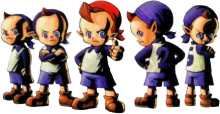 Sorry, I just felt that these guys deserved that intro. The Bombers are, as their title suggests, a secret society that resides within Clock Town that strive to serve justice wherever it is required. This sort of an organisation sounds like something that adults would form, or people that have a deeper understanding of life, love, and justice. But no, it’s a bunch of kids.
Sorry, I just felt that these guys deserved that intro. The Bombers are, as their title suggests, a secret society that resides within Clock Town that strive to serve justice wherever it is required. This sort of an organisation sounds like something that adults would form, or people that have a deeper understanding of life, love, and justice. But no, it’s a bunch of kids.
This would suggest that these kids know what they’re doing, or that they are quite mature for their age. However, I believe that there are two sides to this coin: they are mature in that they understand the darkness and sorrow in their township, but they are immature in that they probably don’t understand what justice is.
I came to this conclusion for one reason: justice is not definitive. Is justice when a person gets their way, or is it when all parties involved in a dispute are satisfied? Is justice when the laws are abided by, or when they are broken for a good reason? Is justice when the villain is punished? But the question remains, who was the true villain? The line between justice and injustice is frequently blurred, to the extent that justice is a matter of perspective.
So how can these kids serve justice without understanding the perspective of all parties in a conflict? There is a simple answer: they don’t. They do not serve justice, they simply solve people’s problems. You might argue getting rid of a person’s problems is justice, but think of it like this: what if a person was having trouble solving a math problem; is a little boy coming along, wearing a bandana and having a number on his back, and solving the problem, justice?
You might argue that that is something completely different, but it isn’t really. The common belief of justice is when an argument between two parties is resolved, the good guy gets what he deserves, and the bad guy gets what’s coming to him. As far as we can see in Majora’s Mask, the Bombers do very little in the way of serving justice, in terms of the common belief.
If you ask me, the title, ‘Bombers Secret Society of Justice’, is one big misnomer, a word which here means, ‘a big, fat lie’. The only thing that’s technically true about it is the fact that it is a secret society; apart from that, they don’t really serve justice… and since when does a bomber, of all people, do anything good?
Please excuse Link running around with bombs blowing up bad guys from the above rhetorical question. The only other thing about the mysterious Bombers… actually, before I get to that, why are they called the Bombers? They don’t exactly walk around with bombs, nor do they bomb things. Perhaps a previous person they helped said something along the lines of, “Yo, kid! You da bomb, man! Fanks for helpin’ me solve me maffs problemo!”… but I doubt it.
Anyway, getting back to the other mysterious thing about the Bombers: what are their motivations? Given that both Kafei and Skull Kid used to be members, the society has definitely been around for a while, but what was the inspiration behind the forming of the original society? Perhaps they witnessed the injustice that Skull Kid inflicted upon the inhabitants of Termina after the Four Giants left him, and decided to band together and stop it? That’s my theory, but really, the idea could’ve come from an observation of any form of injustice. Why do you think the Bombers have their name? Do you feel they do serve justice (keeping in mind that, in Majora’s Mask, Link is the only one solving problems)? What do you think their motivations are, or the circumstances of the founding of the society? Let me know in the comments.
Gorman Brothers
Outside Clock Town, there exists, a brotherhood… one of suspicion and contempt… their motivations are clear, and their intentions are ill…
…they are not the Bombers Secret Society of Justice!
 No, they are the Gorman Brothers. While there are in fact three Gorman Brothers, the middle brother, referred to simply as Gorman, is more kind-hearted and benevolent than his two brothers, and left when he was younger, having not been able to care for and train for the horses the way his brothers could, instead going into show business, and is now the leader of the Gorman Troupe.
No, they are the Gorman Brothers. While there are in fact three Gorman Brothers, the middle brother, referred to simply as Gorman, is more kind-hearted and benevolent than his two brothers, and left when he was younger, having not been able to care for and train for the horses the way his brothers could, instead going into show business, and is now the leader of the Gorman Troupe.
The youngest and oldest Gorman Brothers, on the other hand, apparently share darker personalities, being known to be rude to everyone else and going to great lengths to cheat competitors out of business. Together, they run the Gorman Track, just off the road that leads to Romani Ranch.
I can’t help but wonder what fuelled this aggression? It’s most likely not a parental influence, given that Gorman grew up with a sense of morality, though we can’t rule that out completely, because there is always the possibility that Gorman saw the nature of his guardian, and what his brothers were slowly becoming, and, not wanting to be that way, left, in addition to the fact that he couldn’t care for the horses the way his brothers could.
But I don’t think the Gorman Brothers are particularly bad people, for two reasons: one, they are not cruel to the horses, and two, Gorman had this to say about them:
“Aren’t you going to flee? If you have nowhere else to go, you should seek refuge at the Gorman Track in the south. That is my brothers’ ranch. My older brother… he’s a nice guy.”
Sure, he’s only referring to his older brother, and yes, through the good times and the bad, brothers do think positively of each other, but animal cruelty is one of those things that is simply not tolerated in Western societies, because only the most despicable people do it. The Gorman Brothers treat their animals well, which shows that there is a compassionate side to them.
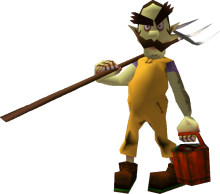 I believe that they were embittered by their brother leaving them. This is never suggested in-game, but it makes sense: you and your siblings are destined to inherit your parents’ racecourse and horses, you want to do them proud, and you’re confident that you will. But then one of your siblings leave. You feel betrayed, or dishonored, that your sibling could turn their back on you, your other sibling, and your parents’ legacy. Your lost sibling believes they’ll do better in another career, but you want to prove them wrong; you want to show them what they’re going to miss out on.
I believe that they were embittered by their brother leaving them. This is never suggested in-game, but it makes sense: you and your siblings are destined to inherit your parents’ racecourse and horses, you want to do them proud, and you’re confident that you will. But then one of your siblings leave. You feel betrayed, or dishonored, that your sibling could turn their back on you, your other sibling, and your parents’ legacy. Your lost sibling believes they’ll do better in another career, but you want to prove them wrong; you want to show them what they’re going to miss out on.
However, you also have strong competition over at Romani Ranch. You know that the only way you could be successful and to show your lost sibling that they were wrong is to make you and your still-present sibling successful. But to do that, you’re going to have to remove the competition. As a result, with no other means to get rid of them, you spread rumors about Romani Ranch and you try to destroy their cargo when they go to make a milk delivery. The guilt of what you’ve been reduced to, combined with the painful reminder of why you’re even doing it, leave you filled with regret, and with no other way to vent your feelings, you end up being rude to potential customers.
It may seem like there are few holes in their somewhere, but keep in mind that it’s one thing to read that… it’s another thing to feel it. Regret is the most destructive force in existence. And that’s not all just going to happen in sequence; as time goes on, the feelings will sink their teeth in and hurt more and more. The memory of their brother leaving them truly, deeply hurt the Gorman Brothers, and the pain they felt only intensified as time went on.
This is why I believe that the Gorman Brothers are not bad people, they’ve just been tarnished by past experiences, and have not been able to withstand the power of their emotions. That doesn’t justify their behavior, but it allows us to understand their motivation. Obviously, that’s just my theory, I could be wrong, they might actually be bad people, directing their only sympathy at their horses, but that’s how I feel about these two. But what do you guys think? Are the Gorman Brothers good people, scarred by past experiences? Or are they terrible, terrible people who care only for themselves and their horses? Let me know what you think in the comments.
Romani and Cremia
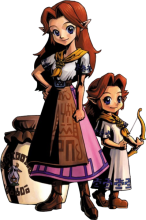 Romani and Cremia are the sisters who own and run Romani Ranch. Before continuing, if you are not well acquainted with these two, Cremia is the older sister, and Romani is the younger one. Furthermore, Romani was named after the ranch, not the other way around.
Romani and Cremia are the sisters who own and run Romani Ranch. Before continuing, if you are not well acquainted with these two, Cremia is the older sister, and Romani is the younger one. Furthermore, Romani was named after the ranch, not the other way around.
After the death of their father, the responsibilities of looking after the ranch fell to Cremia, who struggled to cope. Cremia juggles the well-being of their livestock, keeping up produce, keeping the ranch in a fit state, the recent troubles concerning the upcoming wedding of her best friend, Anju, ensuring that she can support Romani and herself, as well as caring for Romani. Recently, Cremia has found the cows in an uncomfortable state and broken jars around the ranch, but doesn’t know what to think of it.
Romani also has her own issues to work out. In the past, ‘They’ have come. ‘They’ is the simple way that Romani describes the ghosts/aliens that return to the ranch every year as the Carnival of Time approaches. This year, Romani has been practicing with her bow and arrow, so that she can defend the ranch and save the cows. She has tried getting her older sister to help her, but Cremia doesn’t believe in Romani’s ghosts, and worries about her little sister’s wellbeing.
The idea that I’ll be exploring with these two is Romani’s maturity, a problem that concerns both sisters. From Cremia’s perspective, Romani is still young, but she is unsure of her maturity. Romani believes in ghosts, refers to herself in the third person, and jogs around the ranch with their pet dog. If this was your little sister, what would you think? Is she simply expressing her childhood fears? Is she okay upstairs? Is she enjoying life?
And then there’s Romani’s determination to defend the ranch. She has demonstrated great self-discipline, dedicating a large portion of her free time to training herself in the use of the bow and arrow. This is the sort of behavior that is commonly found in adolescents, demonstrating her maturity.
Cremia doesn’t know what to think, and is too preoccupied with other issues to take any action toward it, only making certain that Romani is happy. Unfortunately, keeping Romani happy is another thing entirely. Romani desperately wants to go to the Carnival of Time and drink some Chateau Romani, but Cremia insists that she must wait until she is an adult.
Romani is frustrated with the way her older sister treats her, feeling that she is as much an adult as Cremia is. Cremia on the other hand, is only treating Romani as a child due to her uncertainty as to her younger sister’s maturity. However, on the final day, if Link has helped Romani save the cows and protected Cremia’s carriage when she took the latest delivery of milk to Clock Town, Cremia changes her mind.
When Cremia took the milk to Clock Town, she asked Romani to stay and look after the barn during her absence. Despite wanting to go with her sister, Romani did as she was told. If Link successfully protects the carriage, then, upon Cremia’s return to the ranch, she tells Romani that she is now an adult, promising her that she can have her first taste of Chateau Romani, that she’ll make her a mask to signify her maturity, and that Romani can sleep in her bed that night.
Knowing the Cremia is unaware of her actions in saving the cows from Them, Romani would most likely assume that is because of her recent behavior, topped off by her recent work looking after the cows while Cremia was making a delivery. Or she would be so excited that she wouldn’t even think about it. Cremia, however, did it because she knew the Moon would fall that night, and wanted her sister to be an adult before the end. Some might take Cremia allowing her sister to sleep in her bed with her to be a sign that Cremia still feels Romani is a child, but I feel that it is simply because Cremia doesn’t want her sister to be alone on her final night, and that she doesn’t want to be alone, herself.
How do you feel about the situation? Do you feel Cremia was wrong to put off acknowledging her sister’s maturity? Do you feel that Romani wasn’t mature enough? Let me know in the comments.
Zubora and Gabora
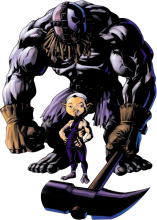 Zubora and Gabora are the blacksmiths that can be found in the Mountain Smithy, situated in the oddly named Mountain Village (oddly named because there’s only one building there: the Smithy). In-game, Link has the option to unfreeze their hearth so that they can upgrade his sword. Again, if you are unfamiliar with the pair, Zubora is the man and Gabora is the large, hulking golem.
Zubora and Gabora are the blacksmiths that can be found in the Mountain Smithy, situated in the oddly named Mountain Village (oddly named because there’s only one building there: the Smithy). In-game, Link has the option to unfreeze their hearth so that they can upgrade his sword. Again, if you are unfamiliar with the pair, Zubora is the man and Gabora is the large, hulking golem.
The relationship between the pair is an interesting one: they appear to be business partners, but upon closer observation, it is more of a master-servant relationship. Zubora appears to be quite lazy, as he is always sitting around whenever you enter the Smithy, and Gabora is the only one who is ever seen doing any actual work.
Furthermore, Zubora clearly believes himself to be the superior one:
“I am Zubora, the owner. […] That huge fellow is my assistant, Gabora. He’s all brawn and about as smart as a Deku Stick.”
In addition, Zubora doesn’t often direct sympathy toward his assistant, yelling at him to get coffee, and when he’s too slow, Zubora will tell him to forget about it; and if Gabora attempts to add something to the conversation between Zubora and Link, Zubora will snap back:
“Don’t act like you know what you’re talking about, you Deku Stick!”
Clearly, Zubora is a different man behind his smiling, cheery face. Given Gabora’s position of servitude and rough appearance, it is curious as to whether he is actually a person. His grunts, lack of dialogue, and, as aforementioned, his rough appearance are not unlike the traits of Frankenstein’s Monster, suggesting that he is some form of golem, created by Zubora or his family to serve them, or at least help them in forging new swords.
However, now that Gabora has been left in the sole possession of Zubora, Zubora uses him as an excuse to earn money without doing any work. That’s it for their relationship, but one further question: what is Gabora? There’s always the possibility that he is just a golem, created to help forge swords; but what if he isn’t? Could he be a member of Zubora’s family who had his face mutilated? Those two possibilities are equally disturbing, and with that in mind, I can’t help but wonder what other possibilities there are?
Some interesting tid-bits to point out are that the Hylian script on Phantom Ganon’s sword in The Wind Waker reads ‘Zubora Gabora’ and that, when you remove the ‘and’, there is a similarity between their names and Kaepora Gaebora. I personally don’t know what to make of these, because Zubora and Gabora couldn’t have made Phantom Ganon’s sword, because, for one, they are not only in a different timeline, but a different world, and two, they create physical swords, not paranormal solid-shadow swords, or whatever it’s made out of. And apart from names, there are no similarities between Zubora and Gabora, and Kaepora Gaebora.
And that brings us to the end of this mega-long editorial, which I really should’ve split into two parts, but oh well. As a quick recap: what do you make of the Bombers? Do they serve justice, why are they called Bombers, and do you think they have a true understanding of the term ‘justice’? Do you feel the Gorman Brothers are terrible people who only treat their horses nicely, or have they simply been scarred by past experiences? Do you think Cremia was right to continue treating Romani like a child, or should she have acknowledged her as an adult earlier? And getting back to Zubora and Gabora, what do you guys think of those fun facts I mentioned? What do you think Gabora is? Why do you think Zubora treats Gabora the way he does? Let me know your ideas in the comments, and quickly before I go, due to the lack of depth given to the characters in Four Swords, instead of doing a three-part miniseries, I’m compiling them all into a single editorial, so you have that to look forward to next week! Until then, Zelda Dungeoners!



